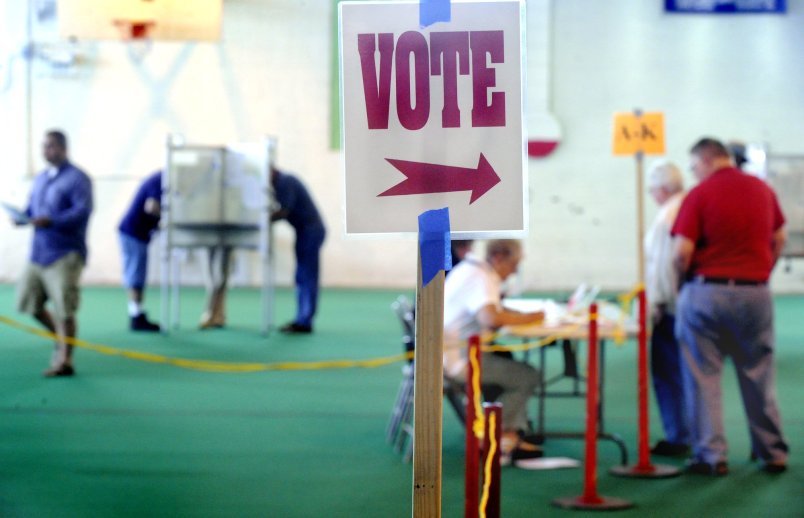PORTLAND, Maine (AP) — Voters marking a single candidate on a ballot? That’s so 20th century.
A new way of voting in Maine allows people to rank candidates from best to worst with provisions for additional voting rounds, candidate eliminations and extra tabulations to ensure there’s a consensus winner who collects a majority of the votes.
The ranked-choice voting system will be used for the first time in history in U.S. House and Senate races in Maine on Election Day.
Advocates hope the concept will spread to other states, providing more choices for restless voters and tempering hyper-partisan politics.
“There’s the saying, ‘As Maine goes, so goes the nation,'” said Rob Richie, from electoral reform group FairVote, referring to the days when Maine’s early election served as a national bellwether. “Other states will be looking to Maine’s experience with interest.”
The system works like this: Voters rank candidates. A candidate garnering a majority of first-place votes is the winner.
If there’s no majority winner, the last-place candidate is eliminated and the losing candidate’s second-place votes are reallocated for another voting round. The computerized tallies are repeated in a game of political survivor until someone captures a majority.
Maine residents approved the system in 2016 after nine of the past 11 gubernatorial elections resulted in winners who had failed to get a majority of the vote. The current governor, tough-talking Republican Paul LePage, first won election with about 38 percent of the vote in 2010.
In a twist of fate, the system won’t be used for the governor’s race or legislative races, which also are on the Nov. 6 ballot, because of concerns it runs afoul of the Maine Constitution.
But it was used without any major problems in June’s primary . And it will be used again in November’s federal races. And the idea is gaining momentum in other states, including Massachusetts, Richie said.
Cushing Samp, of Saco, said she began advocating for the new system after she volunteered for an independent candidate four years ago. Many voters told her they liked the independent but “didn’t want to throw their vote away.”
Supporters say the system removes the “spoiler” effect and allows voters to cast tallies for a third-party or independent without fear of a wasted vote. That’s because their second-choice would be counted if there’s no majority winner.
“It allows you to vote for the person who you really like regardless of what that person’s chances of winning are,” she said.
The potential impact could be seen in the liberal, southern 1st Congressional District. Rep. Chellie Pingree, a Democrat, would be a shoo-in under traditional voting, but a three-way race with ranked-choice voting changes the calculus.
Independent Marty Grohman sees a path to victory if Pingree fails to reach 50 percent of first-place votes and if he collects enough second-choice votes from supporters of Republican Mark Holbrook in the next round.
To the north, Republican Rep. Bruce Poliquin’s Democratic challenger, Jared Golden, could be aided by second-choice votes from two independents under a similar scenario in the more conservative 2nd Congressional District.
For the system to work as intended, voters have to rank the candidates, but it’s unclear how many will do so when they get to the polls. Both Poliquin and Pingree say they intend to cast a single vote for themselves, instead of ranking the candidates.
Ranked-choice proponents say the system discourages candidates from making negative attacks for fear of alienating supporters of other candidates, thus shifting debate from political extremes to the political center.
Critics say voters are not well served by homogenized campaigns and that fiery rhetoric is good for differentiating the candidates.
Some, like Patty Keyes, of Belfast, said voting should be kept simple. The new system “just complicates things.”
Also called instant runoff, the system is used in 11 local jurisdictions across the country, including mayoral elections in Maine’s largest city.
But there’s nothing instant about the process in Maine.
If there’s no first-round winner, then the ballots have to be shipped to the state capital and scanned into computers before additional tallies can be completed.
It took eight days before the winners were announced in the ranked-choice primary elections in June in which extra rounds were necessary.
No one challenged the outcome in the courts. But that remains a possibility if a loser decided to challenge a ranked-choice conclusion.
Secretary of State Matthew Dunlap, a Democrat, was skeptical because the voter-approved referendum instituting ranked-choice voting didn’t include any provisions for how such an election would be conducted. Election officials scrambled to put rules into place.
Voters seemed to be patient about the delayed results.
Dunlap is now a believer. “We had a lot of a success. We learned some lessons. We made some adjustments. Now we know what the blueprint looks like,” he said.







In most cases ranking vote gives no option to the voter. There is Dem, Rep. Green party or some other off the wall candidate.
This is not a choice it is a take it or leave it vote.
Has Donnie Jr. supplied the Russians with the operating manuals and system passwords yet?
Hop to it, boy!
Voters Rank Rank Candidates
I used this system of voting to make choices when I had a large staff and we had to decide all important issues like what kind of coffee to buy for the break room. It works great when people take it seriously and are voting on something they know about and have opinions on. In the tribal politics of today, I can imagine some bad outcomes, but I will withhold judgment until Maine has used it for a while. It is an interesting experiment.
Most Maine voters take their vote seriously. I have high hopes for this system to produce the best elected official possible in these trying times. No more LePage please.